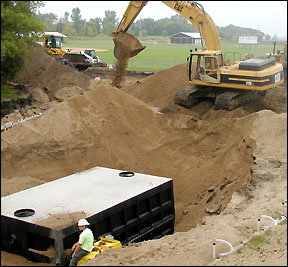Roscoe building city-wide septic system
Contractors began installing the city's septic system in August. With work on a large holding tank and drainfield on the outskirts of the city completed, contractors have moved into the city to begin laying drain pipes to residences and installing septic tanks in clusters.
The new system will function similarly to a residential septic system but on a larger scale. It will use septic tanks - most shared by three or more homes - that will drain into a common collection tank and eventually into a common drainfield west of town near the ballpark.
The septic tanks are typical concrete tanks. The city decided to use clusters of small septic tanks that can be easily replaced or expanded if necessary.
Wherever possible, the tanks will be located along property lines, and a special effort will be made to not disrupt lawns and gardens during tank installation, according to city council member Mike Christian.
Locating tanks and pipes in easements and alleys will also help minimize damage to city streets, said mayor Don Heinen. According to Heinen, contractors will bore under city streets wherever possible, minimizing the time that any city street is closed.
The city of Roscoe - population 116 in 2000 census - first considered a city-wide waste treatment system in 1976 when it built a city water system, but funds weren't available for a wastewater system back then.
 In the 1990s, Roscoe was granted a moratorium from septic system improvements while the city considered options for a city-wide system. In 2000, with the moratorium due to expire, the city still had not decided on a plan. The city council approved the current design in 2002.
In the 1990s, Roscoe was granted a moratorium from septic system improvements while the city considered options for a city-wide system. In 2000, with the moratorium due to expire, the city still had not decided on a plan. The city council approved the current design in 2002.
Construction crews install a holding tank as part of Roscoe's new city-wide septic system. When the $279,000 project is completed in mid-October, it will work much like and individual septic system, with shared septic tanks and a common holding tank and drainfield.
The city wanted to begin construction on the project last fall, but the permitting process took longer than anticipated and the city was forced to push the project back.
According to Christian, some individual systems in the city were already failing or were not in compliance with the state standards. Because of setback requirements and the city's soil conditions, residents who needed to replace their septic systems could have found it costly or impossible to do so in the future.
The city's new system could be less expensive than building individual systems, especially considering Roscoe's high water table, according to Christian, and it will have the added advantage of being inspected regularly.
It's impossible to know whether having a city-wide septic system will attract new residents, but it can't hurt, said Heinen.
The city borrowed $279,000 for the project, with the loan to be repaid by residents in the form of special assessments and monthly user fees, which will also be used to build a maintenance fund and a replacement fund.
According to Heinen, assessments should be about $3,000 per residential unit or business - 57 in the city currently - and the user fee could be about $20 per month, but the exact amounts won't be known until the project is finished.
At those rates, the city could collect $17,000 per year in assessments for 10 years. In addition, the monthly fees would generate another $13,680, for a total of $30,680 per year, covering the city's expected costs.
Annually the new system should cost about $31,000 to run and retire the debt. Operation costs, including administration, should run about $1,500 per year, and the city plans to put aside $2,000 per year to have funds available when the system needs to be replaced.
The tanks will be pumped regularly, and water draining into the drainfield is filtered twice - once for fibers and once for microbes. This should increase the life of the system, said Christian. A typical city sewer system is expected to last about 20 years, but Roscoe's system should last about 40 years, said Christian.
Contact the author at editor@paynesvillepress.com • Return to News Menu
Home | Marketplace | Community